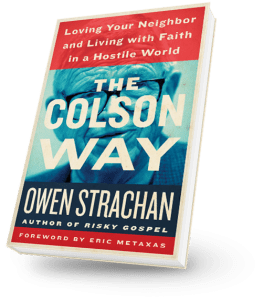 Do you like to think about “culture” and cultural engagement? I do. Many young evangelicals do.
Do you like to think about “culture” and cultural engagement? I do. Many young evangelicals do.
I just wrote a review for Christianity Today of a brand-new book by one of evangelicalism’s sharpest young thinkers, Brett McCracken. McCracken, author of the acclaimed Hipster Christianity, just released Gray Matters: Navigating the Space Between Legalism and Liberty (Baker, 2013). Here’s a swatch from my review:
I’m not against a deep-dive into heavy material that probes the depravity of the human condition. But remembering Paul’s words has helped me, and frankly has steered me away from material that speaks truly about aspects of life but wraps that message in worldliness. Just because a work of art has a doctrine of brokenness and a type of Christ does not make it worthy of engagement. Some works of art will be; many will not be, particularly as the depravity-meter creeps upward.
This is important stuff that impinges on everyday life. Should you watch, for example, The Walking Dead? Or Mad Men? Or Game of Thrones? Should you listen to Kanye West? This is a broad discussion. Let that be said. I want to build off of my review and give you seven quick principles that I think might help us culture-loving Christians think about what to watch (or engage) and what not to watch. (I couldn’t do this in the review, though as you can see I did begin the conversation that follows in it.)
1. First, if you’re a believer, then you have been redeemed from sin, death, and hell by the atoning death and life-giving resurrection of Jesus Christ. You possess what is often called “Christian freedom.” You are indwelt by the Holy Spirit (2 Cor. 6:16), who is your moral guide, and who leads you to know and live by Scripture as an infallible rule.
2. Second, possessing the Spirit as a Christian under the new covenant means that you do not have to fulfill the Old Testament law as a code for conduct. You are set free from the law (Romans 8:2). Its civil and ceremonial aspects no longer apply to you (though its moral standards, including nine of the Ten Words, surely do).
3. Third, you are called to be comprehensively holy. This standard is by no means relaxed for New Testament Christians. We aren’t saved so that we can do whatever we want. We’re saved to obey Christ (1 Peter 1:14-16). This helps us understand Christian freedom. It is surely, and gloriously, freedom from the law, from guilt, from moralism, and from shame. Amen! But it is not an open-ended freedom, a freedom with no cash value. Let me say it like this: Christian freedom is the freedom to be comprehensively holy in Christ. That is its ultimate meaning.
4. Fourth, the preceding point means for us modern Christians that our compass is not primarily oriented to culture, but to biblical holiness. What does this mean in practical terms? It means that we’re excited about God. We’re amped up about obedience (Psalm 16:11). All of us, in any and all callings, are able to savor the pleasure of giving glory to God through joyful conformity to Christ. That’s our chief delight in life. Without holiness–and nothing else–no one will see the Lord (Hebrews 12:14). Mark that.
5. Fifth, none of this means that we aren’t able and even called to find much joy in “common grace.” Art, movies, family, friends, community, advocacy, television, food, music, sports, literature, travel, and much more should be seen as gifts of God to all humanity, worthy of being pursued and enjoyed. I am, to be clear, an aesthetically-minded Christian, both in the “special grace” sense and the “common grace” sense. I love engaging culture. I relish entertainment. It’s fun. No one who knows me would consider me a staunch cultural separatist.
6. Sixth, the foregoing leads to this, the penultimate synthesis of what I’m sketching here: I should feel completely free to enjoy culture. So yes, I think I actually do glorify God by reveling in his created world, a world that pulses with the exhilaration of intelligent design and the delight of unfettered discovery.
7. Seventh, but here’s the clincher: all things are lawful, but not all things are helpful (1 Cor 6:13). This is the conclusion of my previous points. When I’m trying to decide whether I should watch The Walking Dead, I should ask if it will help me spiritually. Will it build me up? Sure, a given work of art might have a redemptive “Christ type.” But does it also feature nudity and sex and violence? If so, then I’m not simply in the “free to watch” zone of cultural engagement. I am also in the “Is this helpful?” zone. This verse, I submit, is vastly underestimated in Christian cultural theology. I certainly underestimated it earlier in my life, excited as I was by the doctrine of cultural dominion-taking (and I still am!).
So, to bring this all home: I actually do watch The Walking Dead. Sometimes. I don’t have time to watch it regularly; television is not much of a priority right now given my young family and vocational commitments. Entertainment must and should take a backseat. But I run TWD through the grid I just laid out, and it passes through. It doesn’t lead me out of the “helpful” zone. (As an impassioned devotee of the post-apocalyptic genre, I found the first season hair-raising, gripping, and pretty much stunning.) But other shows would. Speaking personally and not necessarily for all, I can’t watch Game of Thrones. From what I understand, it features a good bit of racy content. I don’t need that. It’s not helpful for me spiritually, even though I’m guessing–only a hunch–that I would love the intrigue and drama and medieval setting.
Anyway, that’s a quick and not complete sketch of how I think about what cultural artifacts to engage. Other faithful, gospel-loving Christian friends might disagree with me in points and conclusions. If so, that’s fine. I haven’t offered the above as a monolithic grid. But this is how I try to put things together on a tricky issue, and it’s how I try to help younger Christians–including my students at Boyce College–think well about cultural engagement.
You should buy McCracken’s Gray Matters and consider his own model and suggestions. It’s a well-thought-through paradigm. I enjoyed the book, commend it to you, and found it stimulating (as this very post shows).











